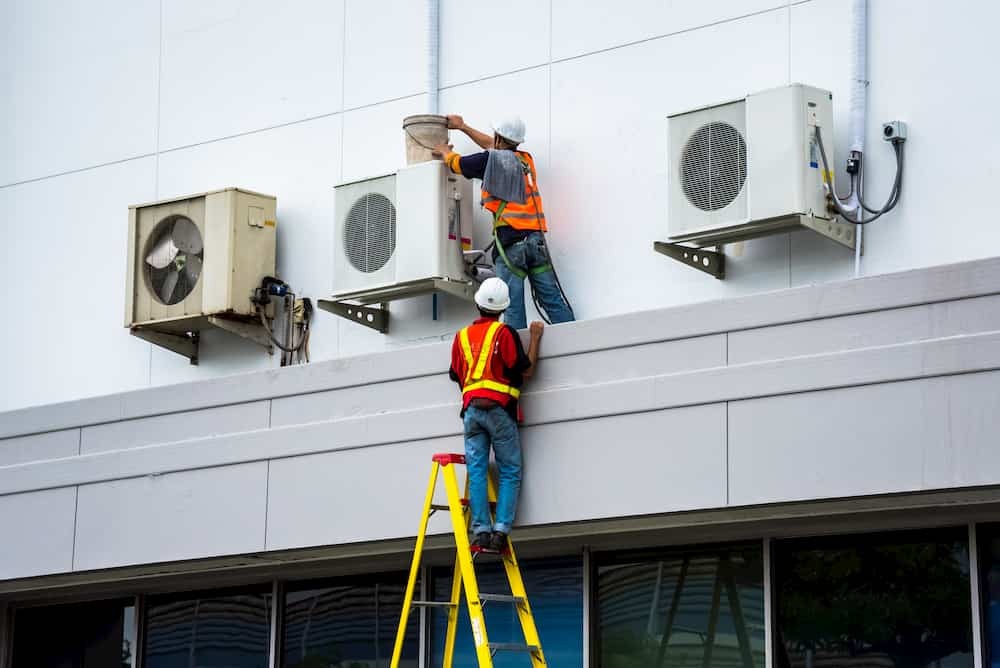Florida’s heat isn’t just tough on people; it’s also brutal on air conditioning systems. With long cooling seasons, high humidity, and coastal salt air, AC units in Jacksonville and throughout Florida work harder than in other parts of the country. This extra strain means certain AC parts are more likely to fail, leading to unexpected breakdowns and costly repairs.
In all our years of AC repair in Jacksonville and throughout Florida, we’ve seen how the extreme climate accelerates wear and tear on HVAC components. Below, we’ll look at the AC parts most at risk in extreme heat and how proper maintenance can prevent expensive repairs.
Compressor – The Heart of Your AC System
Your AC’s compressor is responsible for circulating refrigerant and keeping your home cool. Because it runs continuously in Florida’s heat, it’s one of the most overworked and failure-prone parts. Overheating from excessive strain, refrigerant issues, or electrical problems can cause the compressor to fail. The compressor may be out if your AC is blowing warm air, making loud buzzing or rattling noises, or struggling to maintain the set temperature.
Annual tune-ups are essential to prevent compressor failure. Keeping the coils clean and ensuring proper refrigerant levels will also help extend the compressor’s lifespan. With our experience in air conditioner repair Jacksonville, catching compressor problems early can mean the difference between a simple fix and a costly replacement.
Capacitor – The Power Source for AC Motors
The capacitor is a small but essential electrical component that helps power the compressor, blower motor, and condenser fan motor. Without it, your AC won’t even turn on. Florida’s intense heat can cause capacitors to degrade and fail much faster than in cooler climates. High outdoor temperatures, power surges, and electrical fluctuations are common causes of failure. If your AC won’t turn on, randomly shuts off, or makes clicking sounds, the capacitor may be to blame.
Regular inspections and early replacement of aging capacitors are crucial to prevent capacitor failure. Installing a surge protector can also protect the unit from electrical damage.
Evaporator & Condenser Coils – Where Heat Transfer Happens
Your AC’s evaporator and condenser coils help transfer heat out of your home. In Florida’s humid climate, these coils collect dirt, dust, and even salt air corrosion, reducing efficiency and increasing wear on the system. Homes near the coast experience even faster coil degradation due to exposure to salty air. Dirty coils force the AC to work harder, while restricted airflow can cause ice buildup on the evaporator coil.
If your AC isn’t cooling efficiently, ice buildup is on the indoor unit, or your energy bills are increasing for no clear reason, dirty or damaged coils could be the cause.
Blower Motor – Essential for Air Circulation
The blower motor circulates cooled air throughout your home, but constant use in Florida’s heat can wear it out. Overuse, clogged filters, and restricted airflow put extra strain on the motor, leading to weak airflow, continuous operation without proper cooling, or unusual noises. Replacing air filters every one to three months and scheduling routine maintenance can help prevent failure. Ensuring proper airflow keeps the motor from overheating or burning out.
Keeping airflow unrestricted will ensure the motor doesn’t overheat or burn out prematurely. When homeowners call for AC repair Jacksonville, blower motor failures are one of the most common issues, especially in homes where filters haven’t been changed regularly.
Refrigerant Lines – Carrying Coolant Through the System
Refrigerant lines move coolant between the indoor and outdoor units. If these lines develop leaks, your AC will struggle to cool properly. Over time, refrigerant lines can degrade, corrode, or develop pinhole leaks. Salt air can accelerate deterioration, especially in coastal areas. If you hear a hissing noise near the unit, see ice forming on the refrigerant lines, or notice that your AC is blowing warm air, there may be a refrigerant leak.
Condensate Drain Line – Preventing Water Damage
Florida’s high humidity means AC units remove a lot of moisture from the air. This water drains through the condensate drain line, but when the line gets clogged, it can lead to water damage and mold growth. Algae, mold, and dirt buildup are common causes of clogs, leading to standing water inside the unit. If you notice water pooling near the indoor unit, musty odors from the vents, or your AC shutting off unexpectedly, the drain line may be blocked.
Flushing the drain line with a vinegar solution monthly can help prevent clogs. Scheduling annual maintenance ensures the line stays clear and your AC continues running smoothly.
Thermostat – The Brain of Your AC System
Your thermostat controls when your AC turns on and off. In Florida’s heat, an aging thermostat can struggle to regulate temperatures, leading to inefficiency and overworking the system. Electrical malfunctions, power surges, and dust buildup can cause the thermostat to fail. If your AC isn’t responding to thermostat settings or the temperature readings seem inaccurate, it may be time for a replacement.
Upgrading to a smart thermostat improves accuracy and durability, helping to keep your home comfortable while reducing unnecessary strain on your AC.
Keep Your AC Running Strong in Florida’s Heat
Jacksonville’s climate puts extra stress on AC components, but regular maintenance can help prevent major breakdowns. Keeping your system clean, replacing worn parts before they fail, and scheduling professional inspections can add years to the life of your air conditioner.
Professionals inspect, repair, and replace failing AC parts to keep your system running efficiently. Some may also provide a Maintenance Plan that ensures your HVAC system receives year-round professional care. If you’ve noticed weak airflow, warm air, or unusual noises, schedule an air conditioner repair in Jacksonville and enjoy peace of mind.
